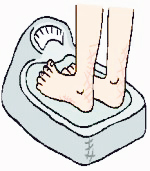Neuronal injections cause long-term weight loss in mice
You found Simon

An injection that stimulates the growth of new brain cells can cause mice to lose more than 15% of their body weight, the researchers say. Experts hope that the treatment, which lasts for weeks, could eventually become a weight loss drug in humans.
The discovery is actually a side effect of a drug tested in the 90s as a treatment for ALS, also called Lou Gehrig's disease. The drug, Exokin, did not improve muscle control as much as they expected, but the participants in the experiment reported a loss of appetite.
The biologists wondered if this effect of suppressing appetite could be harnessed to fight obesity. "People tried to turn lemons into lemonade and asked how such a drug could contribute to weight control," explains Jeffrey Flair from the Harvard Medical School in Boston.
The effect of Exokine itself did not give particularly promising results. The makers of Exokine, Regeneron, conducted clinical trials with Exokine as an anti-obesity drug in 2003, and in light of the findings they abandoned the idea. But researchers realized that a similar drug might be successful in neutralizing the brain's craving for food.
Super big surprise
To study the effects of the drug, Flair and his colleagues tested a compound called CNTF - ciliary neurotrophic factor, which, like exokine, stimulates nerve cells to grow. They injected a tiny amount of the compound into the brains of mice, in the hypothalamus, an area known for its effect on appetite. They also injected the chemical BrdU, which attaches to and labels newly formed cells, with a green color.
The researchers fed the mice a diet high in fat and sugar, equivalent to a person eating two Big Macs and a large soda every day. The Hebrews who were given CNTF injections lost 16% of their body weight in the first two weeks and continued to carry this weight during the 5 weeks in which the experiment was conducted.
Flair's group analyzed the brains of the mice in order to check how this effect occurred. Mice injected with CNTF had about five times more new BrdU-tagged cells in the hypothalamus compared to the brains of mice that were not injected with CNTF. This test proved that the treatment encouraged the growth of new cells. These findings were reported in the prestigious journal Science.
The leptin bond
It is not yet clear how the production of new cells in the hypothalamus suppresses the desire to eat. However, experts assume that it is possible that the excess of cells makes the hypothalamus more sensitive to the hormone leptin. A hormone that regulates appetite. This link between leptin, brain development and appetite has been demonstrated before, but it was assumed to be fixed shortly after birth. Now it seems that it can also be changed in adulthood.
"Deciphering the brain's response to leptin may be a way to control food intake," says Richard Simerli, who has studied hormonal control of appetite at Children's Hospital in Los Angeles. However, he emphasizes that using this approach to develop anti-obesity treatments in humans will take a long time.
For the full information on the Nature website
The nutritionist
https://www.hayadan.org.il/BuildaGate4/general2/data_card.php?Cat=~~~306059352~~~58&SiteName=hayadan
